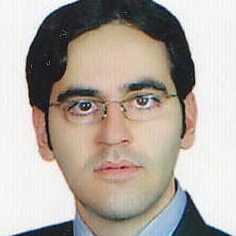
S. A. Hosseini
Work place: Dept. of Electrical Engineering, Center of Excellence on Soft Computing and Intelligent Information Processing, Ferdowsi University of Mashhad, Mashhad, Iran
E-mail: hosseyni@kiaeee.org
Website:
Research Interests: Computer systems and computational processes, Neural Networks, Data Structures and Algorithms, Analysis of Algorithms
Biography
Seyyed Abed Hosseini He is currently Ph.D. candidate at the Control Engineering of the Ferdowsi University of Mashhad, Iran. He currently holds as instructor in the dept. of electrical engineering at Islamic Azad University Shahrood Branch.
He is a member of the Iranian Society for Biomedical Engineering, Tehran, Iran. He has published over 30 journal and conference papers. He is currently a Reviewer for international journals and conferences. He participated in international conferences as a session chair.
His research interests include recognition of emotional stress states based on the analysis of EEG and psychophysiological signals in order to improve human–computer interaction, functional brain modeling, non-linear and chaotic analysis, fuzzy-neural networks, and digital design with FPGA and CPLD.
Author Articles
Qualitative and Quantitative Evaluation of EEG Signals in Epileptic Seizure Recognition
By S. A. Hosseini M-R. Akbarzadeh-T M-B. Naghibi-Sistani
DOI: https://doi.org/10.5815/ijisa.2013.06.05, Pub. Date: 8 May 2013
A chaos-ANFIS approach is presented for analysis of EEG signals for epileptic seizure recognition. The non-linear dynamics of the original EEGs are quantified in the form of the hurst exponent (H) and largest lyapunov exponent (λ). The process of EEG analysis consists of two phases, namely the qualitative and quantitative analysis. The classification ability of the H and λ measures is tested using ANFIS classifier. This method is evaluated with using a benchmark EEG dataset, and qualitative and quantitative results are presented. Our inter-ictal EEG based diagnostic approach achieves 97.4% accuracy with using 4-fold cross validation. Diagnosis based on ictal data is also tested in ANFIS classifier, reaching 96.9% accuracy. Therefore, our method can be successfully applied to both inter-ictal and ictal data.
[...] Read more.Other Articles
Subscribe to receive issue release notifications and newsletters from MECS Press journals